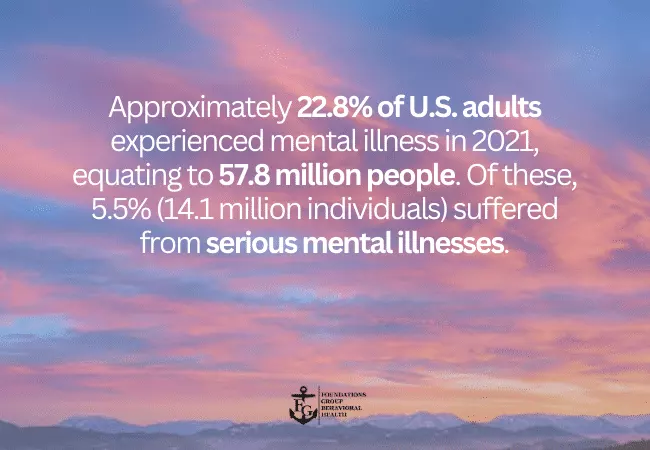Mental health challenges can impact anyone, irrespective of their age, gender, or background. Recognizing the signs of mental instability is crucial for timely intervention and effective treatment. While occasional stress or mood swings are normal, persistent behavioral, emotional, or psychological changes may indicate deeper issues. In this blog, we will explore 16 signs of a mental health crisis and discuss treatment options, including Psychiatric Day Treatment, Half Day Treatment Programs, and Outpatient Mental Health Programs.
Understanding Mental Distress
Mental distress refers to a state of disrupted emotional or cognitive functioning that hinders daily life. It often stems from conditions like anxiety, depression, trauma, or co-occurring disorders. Early recognition of these signs is crucial for effective intervention through treatments like an Anxiety Treatment Program, Depressive Disorder Treatment Program, or Trauma Disorder Treatment Program.
16 Key Signs of Mental Health Crisis
1. Persistent Sadness or Depression
Constant feelings of sadness, hopelessness, or worthlessness can signal depressive disorders. Such emotions interfere with everyday activities and often require professional treatment, such as a Depressive Disorder Treatment Program.
2. Extreme Mood Swings
Frequent and intense changes in mood may be indicative of bipolar disorder. A Bipolar Disorder Treatment Program helps individuals manage these shifts effectively.
3. Chronic Anxiety
Unrelenting worry, restlessness, or panic attacks could be signs of an anxiety disorder. Programs like Psychiatric Day Treatment are designed to provide structured support for managing such symptoms.
4. Social Withdrawal
Avoiding friends, family, or social interactions can reflect underlying emotional distress, including depression or trauma-related disorders.
5. Inability to Focus
Difficulty concentrating or completing tasks might result from trauma, anxiety, or co-occurring disorders. Focus-enhancing strategies are integral to mental health programs.
6. Erratic Behavior
Impulsive actions, sudden outbursts, or unpredictable decisions often indicate underlying mental health concerns.
7. Sleep Disturbances
Chronic insomnia, oversleeping, or erratic sleep patterns are common in conditions such as depression, anxiety, and trauma.
8. Substance Abuse
Using drugs or alcohol to escape emotional pain is often a sign of a co-occurring disorder. Integrated treatment approaches address both the substance use and mental health components.
9. Paranoia or Distrust
Unfounded fears or persistent distrust of others can signal severe anxiety or trauma-related disorders, requiring professional intervention.
10. Irritability or Aggression
Frequent irritability or aggressive behavior may indicate deeper emotional struggles, best addressed through Half Day Treatment Programs or outpatient services.
11. Delusions or Hallucinations
Experiencing sensations or beliefs that aren’t real is a serious sign of mental health disorders that require immediate professional attention.
12. Chronic Fatigue
Mental health challenges often manifest physically, with fatigue being a common symptom of depression, anxiety, or trauma.
13. Self-Harm
Engaging in self-injurious behavior reflects deep emotional pain and necessitates immediate intervention.
14. Poor Appetite or Overeating
Drastic changes in eating habits, such as loss of appetite or binge eating, can indicate stress, depression, or anxiety.
15. Loss of Interest
A marked disinterest in hobbies or activities that were once enjoyable is a hallmark of depression or trauma.
16. Suicidal Thoughts
Expressions of self-harm or suicidal ideation require urgent attention and professional help.

The Role of Behavioral Health Centers in Addressing Mental Health
Behavioral health treatment centers play a pivotal role in addressing mental health. These centers offer evidence-based, person-centered care to help individuals regain control over their mental health. At Foundations Group Behavioral Health, we provide a range of comprehensive programs that cater to diverse needs, including:
- Psychiatric Day Treatment for structured, intensive care during the day.
- Half Day Treatment Programs for flexible yet focused mental health support.
- Outpatient Mental Health Programs for ongoing therapeutic support while maintaining daily responsibilities.
By integrating therapy, medication management, and holistic approaches, these programs are tailored to foster long-term recovery and resilience.
Coping Strategies to Support Mental Health
While professional treatment is crucial, adopting certain coping strategies can enhance mental wellness. Here are some techniques individuals can use alongside therapy:
1. Mindfulness Practices
Engaging in mindfulness activities like meditation or yoga can help reduce stress and improve focus. These practices are often incorporated into programs like the Anxiety Treatment Program and Trauma Disorder Treatment Program.
2. Healthy Lifestyle Choices
Maintaining a balanced diet, regular exercise, and sufficient sleep are essential for overall mental well-being. Lifestyle counseling is a key component of many mental health treatment plans.
3. Social Support
Building and maintaining a strong support network of friends, family, or support groups can provide a sense of belonging and reduce feelings of isolation.
4. Therapeutic Techniques
Cognitive-behavioral therapy (CBT), dialectical behavior therapy (DBT), and other evidence-based modalities empower individuals to reframe negative thought patterns and develop coping skills.
5. Stress Management
Learning to manage stress through relaxation techniques, time management, or creative outlets can significantly improve mental health.
Specialized Treatment Programs for Mental Instability
To effectively address mental instability, Foundations Group Behavioral Health offers a wide range of specialized treatment programs, including:
- Psychiatric Day Treatment Provides intensive, structured care during the day, allowing individuals to focus entirely on their recovery.
- Half Day Treatment Program Offers flexible support, combining therapy and skill-building activities for those needing a part-time commitment.
- Outpatient Mental Health Program Designed for individuals transitioning from more intensive care or needing support while managing daily responsibilities.
- Anxiety Treatment Program Focuses on identifying triggers, reducing symptoms, and teaching effective coping mechanisms.
- Depressive Disorder Treatment Program Helps individuals manage and overcome depression through therapy and medication management.
- Bipolar Disorder Treatment Program Addresses mood stabilization through a combination of therapy, lifestyle adjustments, and medication.
- Trauma Disorder Treatment Program Provides evidence-based therapies such as EMDR and somatic therapy to heal trauma-related symptoms.
- Co-Occurring Disorder Treatment Program Integrates treatment for mental health and substance use disorders for comprehensive recovery.
Why Early Intervention is Crucial
Early intervention is a cornerstone of effective mental health care. Identifying and addressing mental health concerns at their onset can significantly improve long-term outcomes. Mental health conditions, much like physical ailments, tend to worsen if left untreated. Early intervention minimizes the risk of complications, prevents the condition from becoming more severe, and fosters a quicker recovery.
Benefits of Early Intervention
- Improved Prognosis
Early treatment increases the likelihood of successful outcomes. Addressing symptoms promptly can prevent the development of more complex mental health issues and reduce the impact on personal and professional life. - Prevention of Chronic Conditions
Without timely care, mental health issues can escalate into chronic conditions that are harder to treat. Early intervention provides the tools to manage symptoms before they spiral out of control. - Enhanced Quality of Life
By tackling mental health challenges early, individuals can maintain a higher quality of life, preserving relationships, work productivity, and overall well-being. - Reduced Stigma
Seeking help early normalizes mental health care, reducing stigma and encouraging others to prioritize their mental well-being. - Cost-Effectiveness
Early treatment often requires less intensive interventions, reducing the overall cost of care. Delayed treatment, on the other hand, may necessitate more extensive therapies or hospitalizations.
When to Seek Help
Recognizing when to seek professional help is crucial. While everyone experiences stress or sadness occasionally, persistent and debilitating symptoms should not be ignored. Here are some indicators that it’s time to seek mental health support:
Emotional Signs
- Persistent sadness, hopelessness, or a sense of emptiness.
- Intense feelings of fear, worry, or anxiety that interfere with daily activities.
- Uncontrollable mood swings or heightened irritability.
Behavioral Signs
- Withdrawal from family, friends, or social activities.
- Difficulty concentrating, making decisions, or completing tasks.
- Changes in sleep patterns, such as insomnia or excessive sleeping.
Physical Signs
- Chronic fatigue, headaches, or unexplained physical pain.
- Significant changes in appetite or weight.
- Neglect of personal hygiene or responsibilities.
Crisis Indicators
- Thoughts of self-harm or suicide.
- Engaging in risky or harmful behaviors, such as substance abuse.
- Experiencing hallucinations, paranoia, or delusions.
Seeking help early can prevent these symptoms from escalating. If you or someone you know exhibits these signs, programs like the Depressive Disorder Treatment Program, Trauma Disorder Treatment Program, or Co-Occurring Disorder Treatment Program can provide the necessary support.
Take the First Step Toward Wellness
Taking the first step toward mental health recovery can feel overwhelming, but it is a crucial and empowering decision. At Foundations Group Behavioral Health, we are dedicated to helping individuals regain control of their lives through personalized, evidence-based care.
What to Expect
- Initial Assessment
Your journey begins with a thorough evaluation to understand your symptoms, history, and goals. This step ensures that the care plan is tailored to your unique needs. - Personalized Treatment Plan
Based on your assessment, our team will design a treatment plan incorporating therapies, medications, and holistic approaches suited to your condition. Options may include programs like:- Psychiatric Day Treatment: For those requiring structured, intensive daytime care.
- Half Day Treatment Programs: A flexible option for managing mental health alongside daily responsibilities.
- Outpatient Mental Health Programs: Ideal for ongoing support and maintenance.
- Therapeutic Support
Our programs include individual therapy, group therapy, and family counseling to ensure comprehensive care. Techniques like cognitive-behavioral therapy (CBT), dialectical behavior therapy (DBT), and trauma-informed care are integrated into our approach. - Ongoing Monitoring and Adjustment
Recovery is a journey, and our team will regularly review and adjust your treatment plan to ensure optimal progress.
Your Path to Wellness Starts Here
Taking that first step toward wellness can transform your life. At Foundations Group Behavioral Health, we offer a compassionate and supportive environment where you can feel safe and understood. Our programs, including the Anxiety Treatment Program, Bipolar Disorder Treatment Program, and Trauma Disorder Treatment Program, are tailored to help you navigate the complexities of mental health recovery. Contact us today at 508.388.5324 to book your first session and begin your journey toward a more mindful future.
FAQs On Signs of a Mentally Unstable Person
What are the signs of a mentally unstable person?
Some signs include persistent sadness, extreme mood swings, chronic anxiety, social withdrawal, erratic behavior, sleep disturbances, substance abuse, paranoia, and suicidal thoughts. Early recognition is critical for effective intervention.
Why is early intervention important for mental health?
Early intervention prevents mental health conditions from worsening, enhances recovery prospects, and reduces the impact on personal and professional life. It is a key factor in achieving long-term mental wellness.
When should someone seek professional help for mental health issues?
Seek help if symptoms like sadness, anxiety, irritability, or withdrawal persist for more than two weeks, disrupt daily life, or involve self-harm, suicidal thoughts, or substance abuse.
What treatment options are available for mental instability?
Treatments include Psychiatric Day Treatment, Half Day Treatment Programs, Outpatient Mental Health Programs, and specialized programs for anxiety, depression, bipolar disorder, trauma, and co-occurring disorders.
How does Psychiatric Day Treatment work?
Psychiatric Day Treatment offers intensive, structured care during the day, combining therapy, medication management, and skill-building activities to help individuals recover while maintaining daily routines.
What is a Half Day Treatment Program?
A Half Day Treatment Program provides flexible, part-time mental health care, focusing on therapy and support for those balancing treatment with other responsibilities.
What can I expect from an Outpatient Mental Health Program?
Outpatient programs provide ongoing support through individual therapy, group sessions, and medication management, helping individuals manage mental health while living at home.








